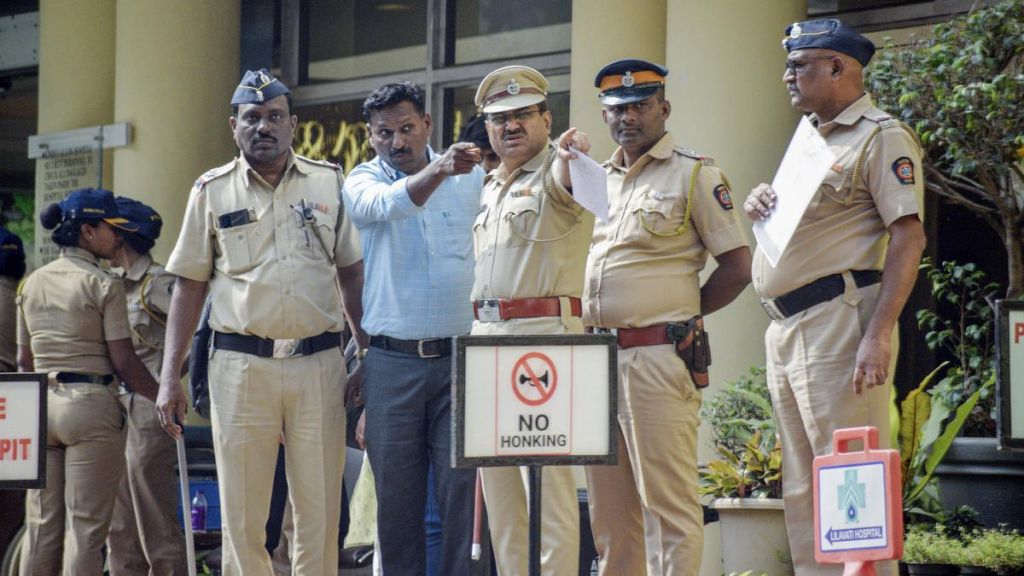
The swift action of the Mumbai police following the attack on film star Saif Ali Khan is commendable. Within hours, the police launched a massive operation, deploying ten teams to trace the culprit. Their investigation, which included analyzing cellphone tower records, led to the identification of the suspect’s movements towards Virar. A day later, the alleged attacker, whose face matched the CCTV footage, was apprehended.
This efficiency highlights the Mumbai police’s ability to act with precision and urgency. However, it also raises an uncomfortable question: why doesn’t this efficiency extend to cases involving ordinary citizens or politically inconvenient crimes?
The murder case of sarpanch Deshmukh offers a stark comparison. Unlike the swift action in Saif Ali Khan's case, the investigation into Deshmukh’s death dragged on for weeks. The suspects, some with alleged political connections, roamed freely across the state, including Pune, without fear of arrest. Even when media reports pinpointed their locations, the police hesitated to act decisively.
This isn’t a case of incompetence. The Mumbai police have repeatedly proven their mettle in high-stakes scenarios. From re-arresting the notorious Charles Shobraj after his escape from Tihar Jail to handling complex investigations, they have demonstrated their capability to rival the best in the world. A famous comparison once likened the Mumbai police to Scotland Yard, prompting then-Police Commissioner D.S. Soman to declare, “Mumbai police is second to none.”
So, what has caused this apparent decline in standards? Two key factors stand out: a lack of effective leadership within the force and the undue influence of political considerations.
The appointment of Rashmi Shukla as the Director General of Police has drawn widespread criticism. Many within the force believe her rise is a result of her proximity to the Bharatiya Janata Party (BJP). This perception of favoritism undermines morale and raises concerns about the impartiality of the police force. Officers in uniform should serve their duty without political affiliations or bias, yet the current environment suggests otherwise.
An example of this bias was evident in the treatment of Walmik Karad, a name linked to the Deshmukh murder case. Karad, arrested in an unrelated extortion case, received VIP-like treatment during his detention. New beds were delivered to the police station on the night of his arrest, ostensibly for the staff. However, the timing raises suspicions of preferential treatment. Such incidents erode public trust in the force’s impartiality.
The Bandra Police’s handling of Saif Ali Khan’s attack contrasts sharply with their response to complaints from ordinary citizens in the same locality. Residents of a building near Khan’s residence reported two intruders who were caught and handed over to the police. Despite being alerted, the police arrived more than 30 minutes later and released the intruders without filing any charges. The emboldened culprits returned to the building shortly after, threatening the security personnel.
This pattern of neglect is not limited to Bandra. In Badlapur, the sexual harassment of two young girls was initially met with apathy by the police. The school involved was allegedly protected due to its connections with the ruling BJP. Delayed action led to widespread outrage, further exacerbated when the main accused, Akshay Shinde, was killed in a controversial police encounter. The timing and circumstances of the encounter have fueled speculation that it was orchestrated to shield influential individuals.
These incidents underscore a worrying trend: the Mumbai police and state law enforcement are selective in their efficiency. High-profile cases involving celebrities or politically neutral individuals are resolved swiftly, while cases involving ordinary citizens or politically sensitive issues are delayed or mishandled.
This selective approach undermines the rule of law and fosters a sense of inequality among citizens. It also damages the reputation of a police force that was once a symbol of excellence and reliability.
As both Chief Minister and Home Minister, Devendra Fadnavis bears ultimate responsibility for the state’s law and order. Restoring public confidence in the police requires decisive action. This includes ensuring that leadership appointments are based on merit rather than political considerations, holding officers accountable for lapses, and reaffirming the force’s commitment to impartiality.
Reforms must also address systemic issues within the police force. Adequate training, resources, and a culture of accountability are essential to restore the quality of the force. Most importantly, the government must send a clear message that the law applies equally to all, regardless of social or political status.
The Mumbai police’s swift action in Saif Ali Khan’s case demonstrates what the force is capable of when it chooses to act decisively. However, the disparity in how justice is delivered to ordinary citizens versus the elite exposes deep flaws in the system.
If the police are to regain their credibility and the public’s trust, they must uphold the principle of equality before the law. This is not just a matter of efficiency but of justice and fairness.
Chief Minister Fadnavis has an opportunity—and a duty—to restore the police force to its former glory. The question is: will he rise to the occasion, or will the cracks in the system continue to widen?
(The author is a senior journalist and media trainer. He tweets at @a_mokashi)